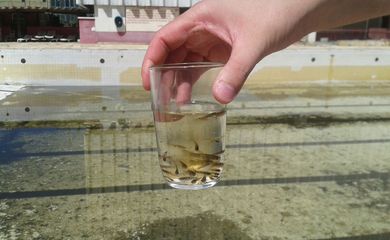USP researchers receive Senegalese team to help study Zika virus


According to the coordinator of the Zika Network, Paulo Zanotto, an ICB researcher, the Brazilian team works in the areas of entomology, virology and immunology, and the Senegalese will collaborate to develop techniques of isolation and virus cultivation. 

A group of researchers from the Pasteur Institute of Dakar, in Senegal, that studies the Zika virus, arrived in Brazil this week to help the task force of scientists from the Institute of Biomedical Sciences (ICB) of the University of São Paulo (USP). The Senegalese team is engaged in the same subject.
Led by Amadou Alpha Sall, the Senegalese research team has over 15 years of experience studying the virus and have also participated in the fight against Ebola in West Africa. The objective is to share experience and train Brazilian researchers to be multipliers and act in case of outbreaks of Zika virus. They will stay in Brazil until Jan. 19th.
According to the coordinator of the Zika Network, Paulo Zanotto, an ICB researcher, the Brazilian team works in the areas of entomology, virology and immunology, and the Senegalese will collaborate to develop techniques of isolation and virus cultivation, to implement serology blood tests and molecular diagnostics, and to examine the relationship of the virus with the vectors, the infection in the nervous system and the microcephaly.
"Everything now is priority: [to give] diagnosis, to monitor pregnant women, to understand the virus biology, to have the entomology forwarded, to strictly control vectors. Our priority is to prevent children to be born with malformation problems," said Zanotto.
Researchers are still studying the link between the Zika and microcephaly. In Zanotto's opinion, at this moment, it is interesting and safer to expect a causative association. "To address the risk, we cannot just wait to establish the causal reaction of the virus with microcephaly. It is much wiser to take it as a working hypothesis and organize ourselves to inactivate the virus. And, as we do not have a vaccine against it, the key is to control the vector," reported the researcher.
Zanotto explained that the team will also test hypotheses raised in previous work on the differences and similarities between the virus in Brazil and in Africa. "We will test these viruses, and compare them in the context of infections in nerve cells, humans with macrocephaly and mice. These studies are very important to explore the relationship between the virus and microcephaly. "
According to Zanotto, researchers are doing their best to prepare the population for the summer period when there is more proliferation of mosquitoes breeding, but it is not possible to predict yet the results at the end of the season.
Translated by Amarílis Anchieta
Fonte: USP researchers receive Senegalese team to help study Zika virus




